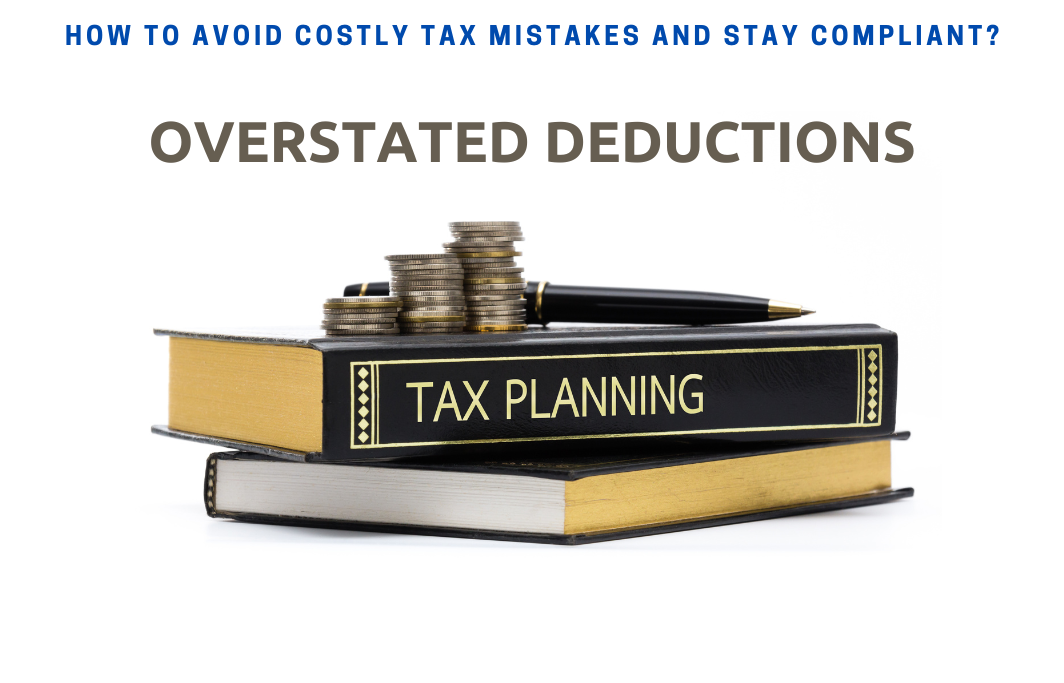November 06, 2024

Mistakes in Filing Taxes: Overstating Deductions
Filing taxes can be challenging, and it’s common to make errors, especially with deductions. Many people unintentionally overstate their deductions due to misunderstandings of tax rules, inaccurate records, or simple calculation errors. Since the IRS scrutinizes incorrect tax filings, it’s important to understand what happens when deductions are overstated and how to address the issue properly.
Common Causes of Overstated Deductions
There are several ways taxpayers can overstate deductions. One involves incorrectly categorizing expenses, such as listing personal expenses as business deductions. For example, if you use your car for both personal and business use but deduct the entire cost as a business expense, that’s a misclassification. Overestimating charitable donations or claiming too much home office space as a business deduction are other common errors. Similarly, claiming expenses that aren’t eligible—like deducting commuting costs as business travel or meals and entertainment expenses that don’t meet IRS guidelines—can lead to inflated deductions.
Consequences of Overstated Deductions
Overstating deductions can lead to various consequences, ranging from minor delays to significant penalties.
- Refund Delays or Adjustments
If the IRS detects discrepancies, it may delay processing your refund until the issue is resolved, which can be stressful if you’re relying on that money. - Long-Term Impact on Tax Filings
IRS adjustments due to overstated deductions may bring greater scrutiny to your future filings. Business owners, in particular, may face reputational risks if these errors continue. - Increased Audit Risk
One immediate risk of overstating deductions is a potential IRS audit. The IRS employs algorithms to flag questionable returns, and inflated deductions are often a trigger. If flagged, the IRS may ask for proof of deductions, potentially resulting in additional taxes owed, interest, and penalties if inaccuracies are found. - Penalties and Interest
If deductions are overstated, and the IRS recalculates your tax obligation, you’ll owe the difference along with penalties and interest. The IRS charges a 20% penalty on underpaid taxes if errors are due to negligence or significant underreporting. A “substantial understatement” typically means the amount understated exceeds the greater of 10% of the correct tax liability or $5,000.
In cases of intentional overstatement, penalties are even steeper. A civil fraud penalty can reach 75% of the unpaid tax amount. For instance, if fraudulent deductions result in $50,000 in unpaid taxes, the penalty could be $37,500. Additionally, the IRS charges 8% interest on unpaid taxes from the original filing due date. - Risk of Criminal Charges
While rare, the IRS may pursue criminal charges if it suspects willful tax fraud, such as repeatedly overstating deductions or concealing income. In such cases, severe consequences can follow.
Solutions for Overstated Deductions
File an Amended Return
The most straightforward correction is to amend your tax return using Form 1040-X. Key considerations include:
- Timing: Amended returns can be filed within three years of the original filing date or two years from when the tax was paid, whichever is later.
- Documentation: Provide documentation supporting the corrected deductions to clarify the initial error and support the revised figures.
Pay Additional Tax Promptly
If the amendment results in additional tax, pay it as soon as possible to reduce interest and penalties. Interest on unpaid taxes starts from the original due date.
Avoiding Overstated Deductions in the Future
To prevent errors, consider using reliable tax software or hiring a tax professional, especially if your situation is complex. Remember, even if a professional prepares your taxes, you are responsible for any errors. Staying informed on tax laws is essential, as these can change. For example, the Tax Cuts and Jobs Act of 2017 made significant changes to itemized deductions, so keeping updated is crucial.
Regularly review your records to ensure accuracy and clarity about which expenses qualify for business deductions. The IRS provides detailed guidelines on various expenses that can be helpful in maintaining accuracy.
Getting Help if You Owe Taxes
Although overstating deductions can lead to stressful consequences, it’s possible to resolve the issue. By filing an amended return, paying any additional tax owed, and improving your record-keeping, you can get back on track. Taking a proactive approach to your tax obligations will help avoid future errors and give you peace of mind.
In this week’s topic, Optima Tax Relief’s Lead Tax Attorney, Phil, examines the choice between itemizing deductions or taking the standard deduction.
For the 2024 tax year, the standard deduction amounts are:
- $14,600 for single filers
- $29,200 for married couples filing jointly
- $21,900 for heads of household
You may benefit from itemizing if your eligible deductions exceed these amounts. Common deductible expenses include:
- Medical expenses over 7.5% of adjusted gross income (AGI)
- State and local taxes (SALT), capped at $10,000
- Mortgage interest (on the first $750,000)
- Charitable contributions
- Casualty and theft losses (in federally declared disaster areas)
If itemized deductions fall below your standard deduction, it’s simpler to take the standard deduction. When in doubt, consulting a tax professional is always advisable.




